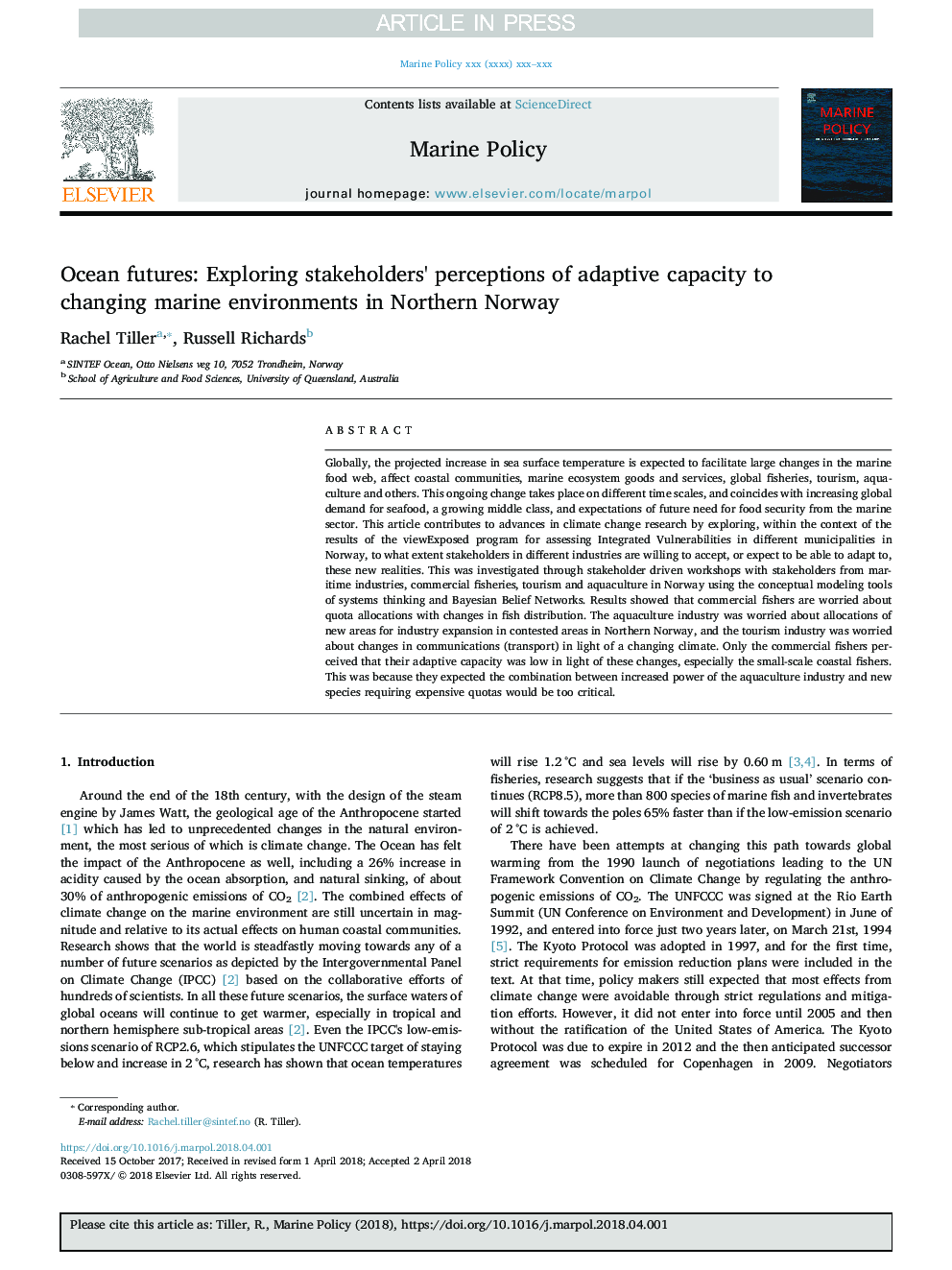| کد مقاله | کد نشریه | سال انتشار | مقاله انگلیسی | نسخه تمام متن |
|---|---|---|---|---|
| 7487788 | 1485484 | 2018 | 12 صفحه PDF | دانلود رایگان |
عنوان انگلیسی مقاله ISI
Ocean futures: Exploring stakeholders' perceptions of adaptive capacity to changing marine environments in Northern Norway
ترجمه فارسی عنوان
آینده اقیانوس: بررسی درک ذینفعان از ظرفیت سازگاری در تغییر محیط دریایی در شمال نروژ
دانلود مقاله + سفارش ترجمه
دانلود مقاله ISI انگلیسی
رایگان برای ایرانیان
ترجمه چکیده
انتظار می رود که در سطح جهانی، افزایش پیش بینی شده در دمای سطح دریا، تغییرات بزرگی در شبکه غذای دریایی، جوامع ساحلی، محصولات اکوسیستم دریایی و خدمات، ماهیگیری جهانی، گردشگری، آبزی پروری و دیگران را تحت تاثیر قرار دهد. این تغییر مداوم در مقیاس زمانی مختلف صورت می گیرد و با افزایش تقاضای جهانی غذاهای دریایی، طبقه متوسط رو به رشد و انتظارات نیازهای آینده برای امنیت غذایی از بخش دریایی همخوانی دارد. این مقاله به پیشرفت در تحقیقات تغییر آب و هوا کمک می کند با در نظر گرفتن نتایج برنامه مشاهده ای برای ارزیابی آسیب پذیری های یکپارچه در شهرداری های مختلف در نروژ، تا چه اندازه ذینفعان صنایع مختلف مایل به پذیرش یا انتظار دارند بتوانند با این واقعیت های جدید سازگار شوید. این کار با استفاده از ابزارهای مدل سازی مفهومی تفکر سیستم و شبکه اعتقادات بیزی، از طریق کارگاه های آموزشی ارایه شده توسط ذینفعان با ذینفعان صنایع دریایی، ماهیگیری تجاری، گردشگری و آبزی پروری در نروژ مورد بررسی قرار گرفت. نتایج نشان داد که ماهیگیران تجاری نگران توزیع سهمیه ای با تغییر در توزیع ماهی هستند. صنعت آبزی پروری نگران تخصیص مناطق جدید برای گسترش صنایع در مناطق متضاد در شمال نروژ بود و صنعت گردشگری در مورد تغییرات در ارتباطات (حمل و نقل) با توجه به تغییرات آب و هوایی نگران بود. فقط ماهیگیران تجاری فهمیدند که با توجه به این تغییرات، ظرفیت انطباقشان کم است، به ویژه ماهیگیران ساحلی کوچک. این به این دلیل بود که آنها انتظار داشتند که ترکیبی بین افزایش قدرت صنعت آبزی پروری و گونه های جدیدی که نیاز به گران قیمت دارند بسیار حیاتی خواهد بود.
موضوعات مرتبط
مهندسی و علوم پایه
سایر رشته های مهندسی
مهندسی دریا (اقیانوس)
چکیده انگلیسی
Globally, the projected increase in sea surface temperature is expected to facilitate large changes in the marine food web, affect coastal communities, marine ecosystem goods and services, global fisheries, tourism, aquaculture and others. This ongoing change takes place on different time scales, and coincides with increasing global demand for seafood, a growing middle class, and expectations of future need for food security from the marine sector. This article contributes to advances in climate change research by exploring, within the context of the results of the viewExposed program for assessing Integrated Vulnerabilities in different municipalities in Norway, to what extent stakeholders in different industries are willing to accept, or expect to be able to adapt to, these new realities. This was investigated through stakeholder driven workshops with stakeholders from maritime industries, commercial fisheries, tourism and aquaculture in Norway using the conceptual modeling tools of systems thinking and Bayesian Belief Networks. Results showed that commercial fishers are worried about quota allocations with changes in fish distribution. The aquaculture industry was worried about allocations of new areas for industry expansion in contested areas in Northern Norway, and the tourism industry was worried about changes in communications (transport) in light of a changing climate. Only the commercial fishers perceived that their adaptive capacity was low in light of these changes, especially the small-scale coastal fishers. This was because they expected the combination between increased power of the aquaculture industry and new species requiring expensive quotas would be too critical.
ناشر
Database: Elsevier - ScienceDirect (ساینس دایرکت)
Journal: Marine Policy - Volume 95, September 2018, Pages 227-238
Journal: Marine Policy - Volume 95, September 2018, Pages 227-238
نویسندگان
Rachel Tiller, Russell Richards,
